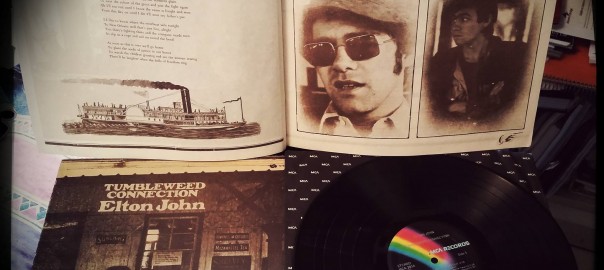Welcome to the first post in a new occasional project: revisiting music that has sat, unplayed, in my vinyl collection for so long I don’t remember what it sounds like. Often these are albums from artists whose other work I like, or that I bought because a song or two caught my attention, or that thought I “should” have for whatever reason. I think we all have managed to accumulate a few of these albums.
So I’ve decided that this blog is a perfect excuse to haul them out, dust them off, give them a spin, and write up short reviews to tell you about them. With luck, I will discover some forgotten treasures. On the other hand it may inspire me to get rid of stuff and open up some much-needed (Much. Needed.) space for albums I might actually want to own.
Tumbleweed Connection by Elton John
Released 1970
Tracklist:
- Ballad of a Well-known Gun
- Come Down in Time
- Country Comfort
- Son of Your Father
- My Father’s Gun
- Where to Now St. Peter?
- Love Song
- Amoreena
- Talking Old Soldiers
- Burn Down the Mission
Tumbleweed Connection is Elton John’s 3rd album, a follow-up to his self-titled second that provided him with his first major hit (“Your Song”). It did well in the charts, reaching No. 2 in the UK Albums Charts and No. 5 in the American Billboard chart. As with most of his albums, John wrote and composed the music and Bernie Taupin wrote the lyrics.
I was never much of an Elton John fan, he was far too pop and mainstream for my taste. But for some reason this album struck a chord—or more accurately, one track from this album dug itself in deep, even if I never much listened to the rest of the album. The beautiful, poignant ballad “Where to Now St. Peter?” resonates with me in a way that few songs do; whenever I work up a list of my favourite songs of all time, it always manages to find its way there. That must mean something.
Tumbleweed Connection is vaguely a concept album, wherein John and Taupin try to capture the Gestalt of some sort of mythic American West. Lyrically it is replete with the themes and tropes of “America”: home and hearth, the old west, The Gunfighter…. I can’t really comment on how well they managed to accomplish that, but musically there is a real western flavour and tang to these tracks, country-rock and bluesy ballads, lovely gospelly vocal harmonies, harmonica and steel guitar and honky-tonk piano…they have pulled off an album of nicely evocative, gentle, country-style songs.
I’m happy to say that this is an album well worth listening to, and I plan to hang on to it. Maybe “Old Soldiers Talking” borders on maudlin, and the piano theme for “Amoreena” is essentially a major-key version of the theme for “Where to Now…” but overall this is an album of fine country rockers, lovely ballads, and very pleasant soft rock time-fillers. And the packaging is vintage ‘70s album-cover: a well-designed gatefold where the album opening is inside at the fold, and a large format book with lyrics and photos. And they manage to put all that quality on a plain-bread 120 gram pressing in a sleeve that doesn’t occupy a half-inch of shelf space the way the modern crazy-thick vinyl covers do (this is a bit of a pet peeve of mine…).
Note: The track “Country Comfort” was written for Rod Stewart, which appeared on his second solo album Gasoline Alley, also in 1970.

